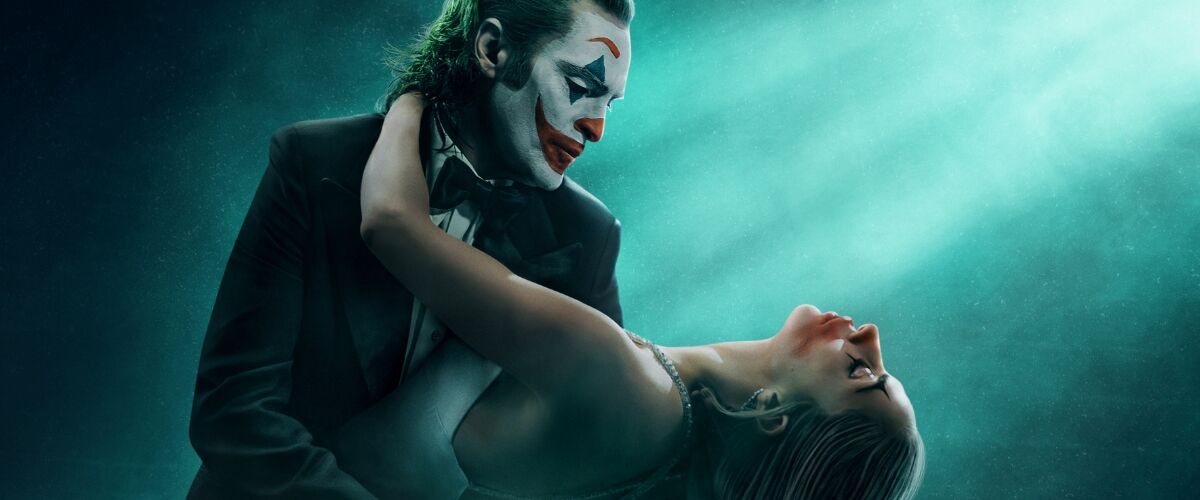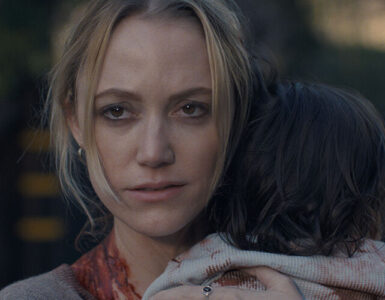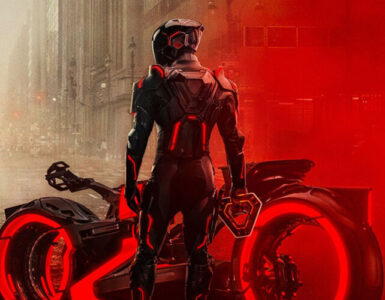The Joker’s enduring popularity is a curious phenomenon. While his status as one of the greatest comic book villains is undeniable, his appeal extends far beyond the pages of DC Comics, captivating audiences and infiltrating pop culture in ways that few fictional characters have achieved. He’s become an icon, a symbol of chaos and rebellion, with his image emblazoned on everything from t-shirts to tattoos. But why? What is it about this agent of anarchy that resonates so deeply with audiences?
Perhaps it’s the Joker’s embodiment of our darkest impulses, the forbidden desires and transgressive thoughts that lurk beneath the surface of civilised society. Characters like the Joker, Breaking Bad’s (2008-2013) Walter White, and Hannibal Lecter offer a vicarious thrill, allowing us to explore the shadows of human nature without consequence. The Joker’s enigmatic origins and ever-shifting persona further contribute to his mystique so with no definitive backstory or singular interpretation regarded as central to the character, he has become a blank canvas onto which audiences can project their own interpretations.

It’s these very questions of identity, morality, and the nature of evil that director Todd Phillips attempts to grapple with in his latest film, Joker: Folie à Deux, a follow-up to his critically acclaimed Joker (2019). A controversial yet undeniably successful venture, Joker ignited a firestorm of debate surrounding its depiction of violence and its potential to inspire real-world harm. Despite the controversy, the film resonated with audiences, grossing over a billion dollars worldwide and earning Joaquin Phoenix (Gladiator, Napoleon) an Academy Award for his portrayal of Arthur Fleck, the troubled comedian turned psychotic killer. While Joker was conceived as a standalone film, its commercial success inevitably paved the way for a sequel, much to the chagrin of some who felt the story had reached its natural conclusion. After all, how much of a criminally insane serial killer can one celebrate?
Joker: Folie à Deux picks up where its predecessor left off, with Phoenix reprising his role as Arthur, now confined to the grim reality of Arkham Asylum and facing trial for his crimes. The depiction of Arthur’s grim existence in Arkham, punctuated by his interactions with cynical guards and the bleak routines of prison life, is captured in stark, unflinching detail. Phillips employs long, unbroken takes that pull viewers into the visceral reality of Arthur’s world, now more confined than ever. As his trial looms, his attorney, portrayed by Catherine Keener (Being John Malkovich), devises a defence that separates ‘Joker’ from ‘Arthur’ – a strategy that aims to leverage his fractured identity for sympathy. Yet, the introduction of Lady Gaga’s (A Star Is Born, House of Gucci) Harleen “Lee” Quinzel throws a wrench into this already precarious plan, adding a new complication to Arthur’s internal struggle.
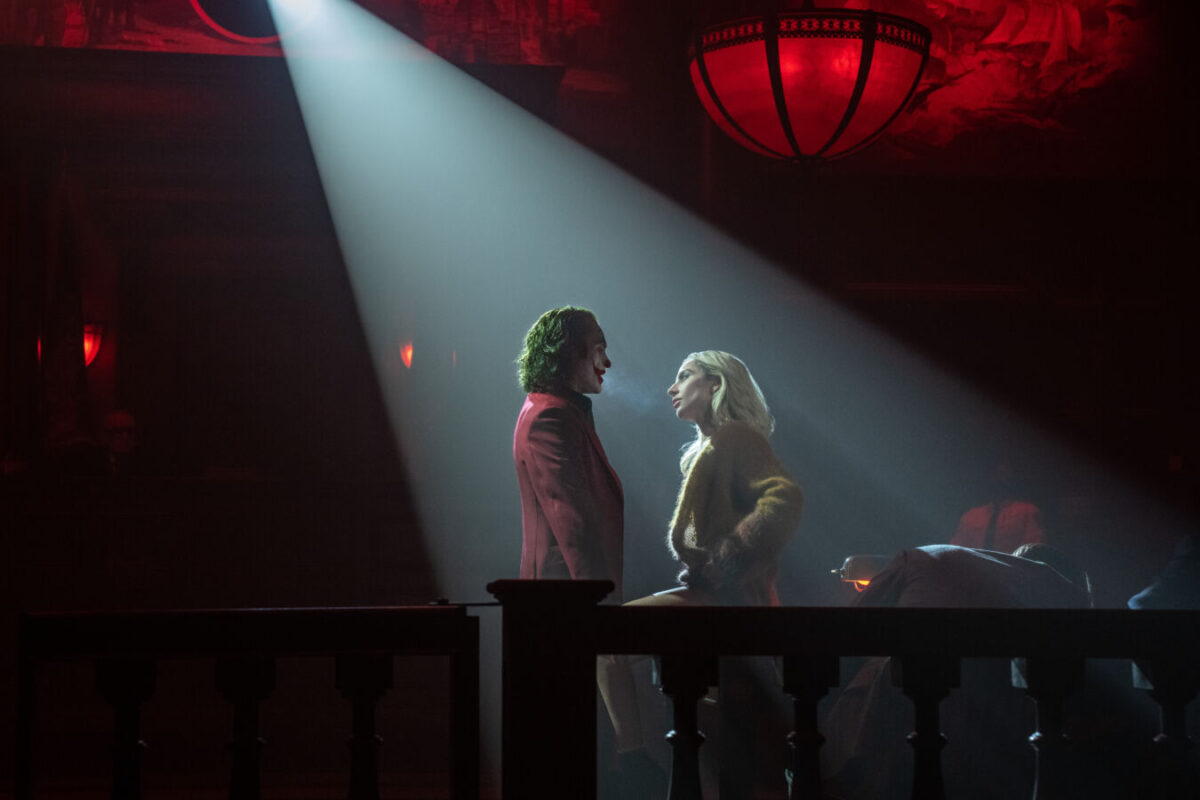
The film takes an unexpected turn, embracing the jukebox musical genre as Arthur and Lee connect through song during therapy sessions. Real and imagined songs, a bizarre mix of familiar ‘60s Hollywood tunes and vintage pop hits à la Bee Gees’ To Love Somebody, Frank Sinatra’s That’s Life, and Judy Garland’s That’s Entertainment!, are scattered throughout the film’s runtime, alongside Phoenix and Gaga who lend their voices to these musical interludes, their performances often accompanied by Hildur Guðnadóttir’s (Joker, Tár) eerie score. While the initial connection between Arthur and Lee is forged through song, the film’s reliance on musical numbers quickly becomes its downfall.
A musical number, at its best, is supposed to elevate a story, allowing characters to express their inner emotions and connect with the audience on a deeper level. Think of the electrifying energy of 2001’s Moulin Rouge! or the heartfelt sincerity of 2016’s La La Land – jukebox musical films that understand the power of music to transform and transcend.
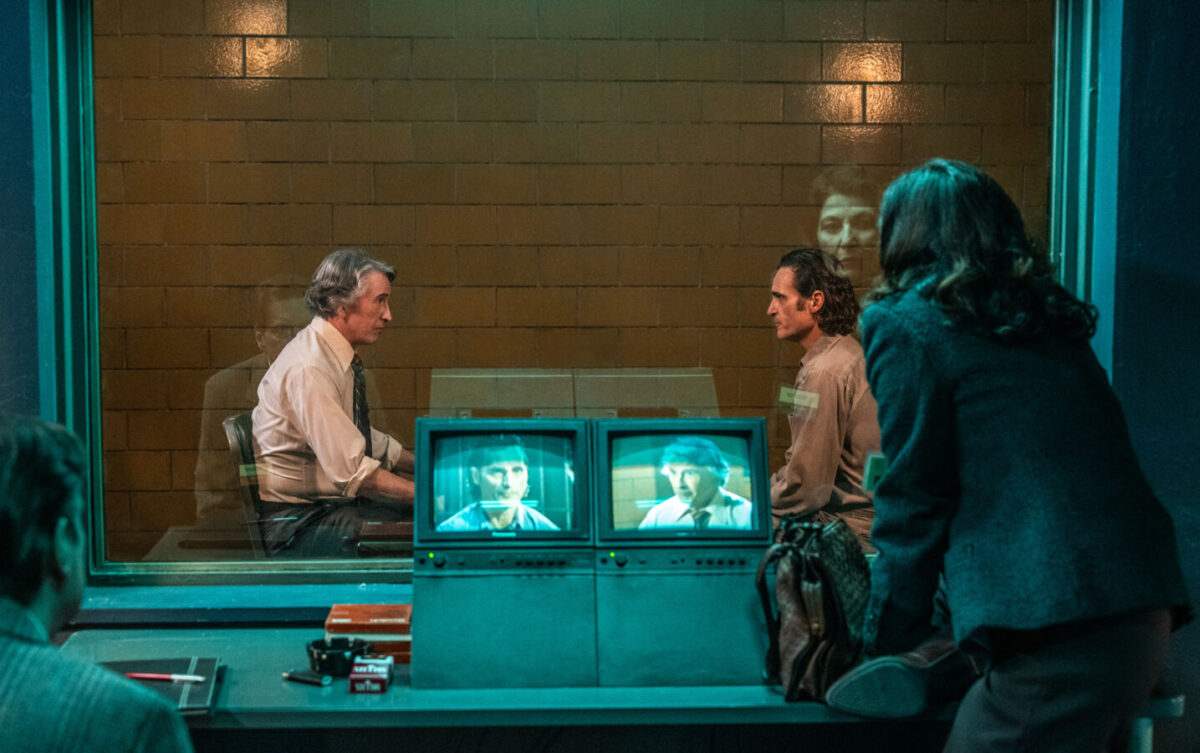
Sadly, this doesn’t seem to be the case for Joker: Folie à Deux, a movie that seems determined to sabotage its own potential, frequently derails the film’s momentum with underwhelming musical numbers. Dramatic scenes, such as a tense interview with a TV host played by The Trip’s Steve Coogan, are abruptly interrupted by jarring musical interludes and on-the-nose lyrical choices. It’s a gamble that doesn’t quite pay off, leaving the film feeling more like a disjointed series of performances rather than a cohesive story.
This disjointedness is further evident in the film’s second act, where the narrative shifts from the confines of Arkham to a courtroom drama that unfortunately recycles familiar plot points without offering any fresh perspectives. Returning characters rehash past events, offering little in the way of new insight. Even the introduction of fan-favourite Gotham’s district attorney turned supervillain Harvey Dent (Harry Lawtey, Industry), while offering a tantalising glimpse into Gotham’s future, ultimately serves as a missed opportunity for deeper thematic exploration on Arthur’s psyche.
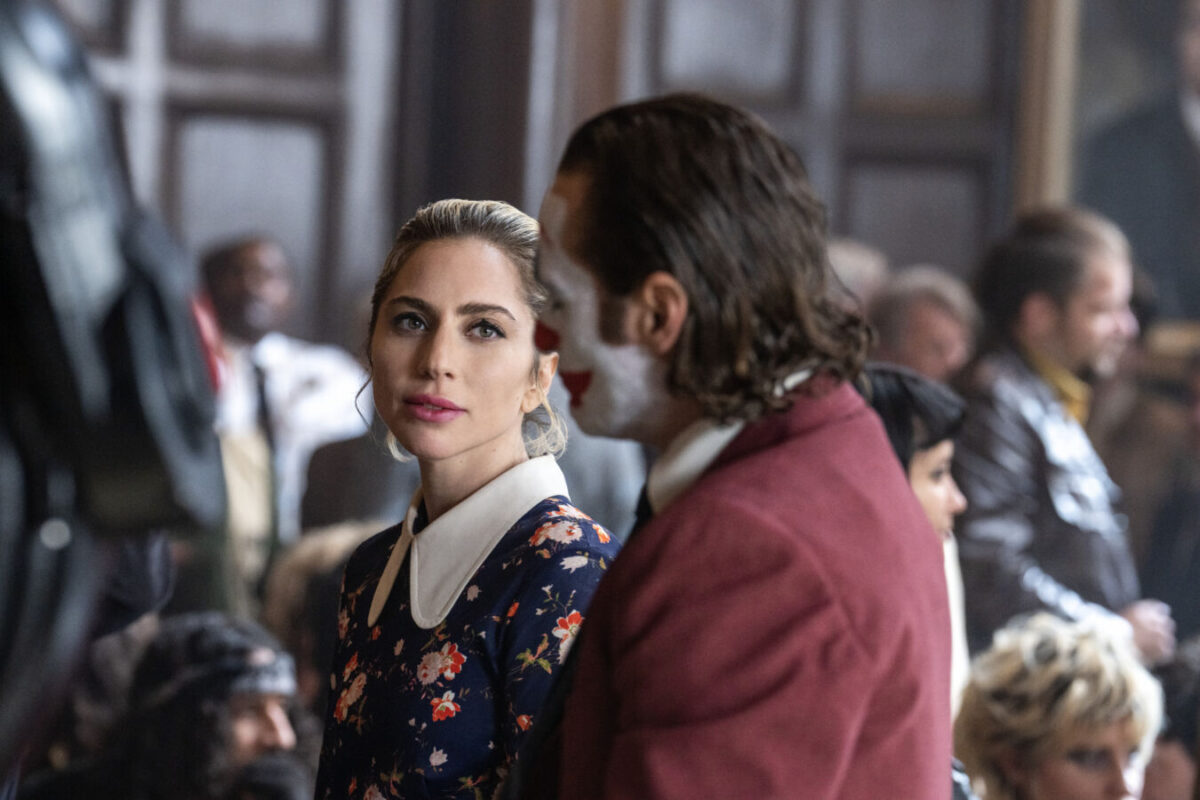
Amidst these retellings, a potentially insightful subplot involving returning character Gary (Leigh Gill, Game of Thrones) teases a deeper exploration of the Joker’s complex character dynamics, hinting at how Arthur’s transformation into the Joker reflects a broader commentary on responding to societal rejection with malevolence. However, this thread, like others, is abandoned too swiftly to resonate fully, leaving the audience with a frustrating sense of unfulfilled potential. Even the potential exploration of Arthur’s future with Lee and the possibility of a family is quickly dropped, suggesting potential narrative paths that are never fully realised.
The addition of Lady Gaga as Lee (Harley Quinn), an eccentric character poised to harness Gaga’s formidable musical and acting prowess, similarly falls flat. Despite high expectations, Gaga’s portrayal of Harley never quite takes flight, lacking the depth and emotional range she demonstrated as singer Ally in A Star is Born, where she commanded the screen with raw emotion and vulnerability. Gaga’s Harley feels strangely subdued, a missed opportunity to showcase her undeniable star power.
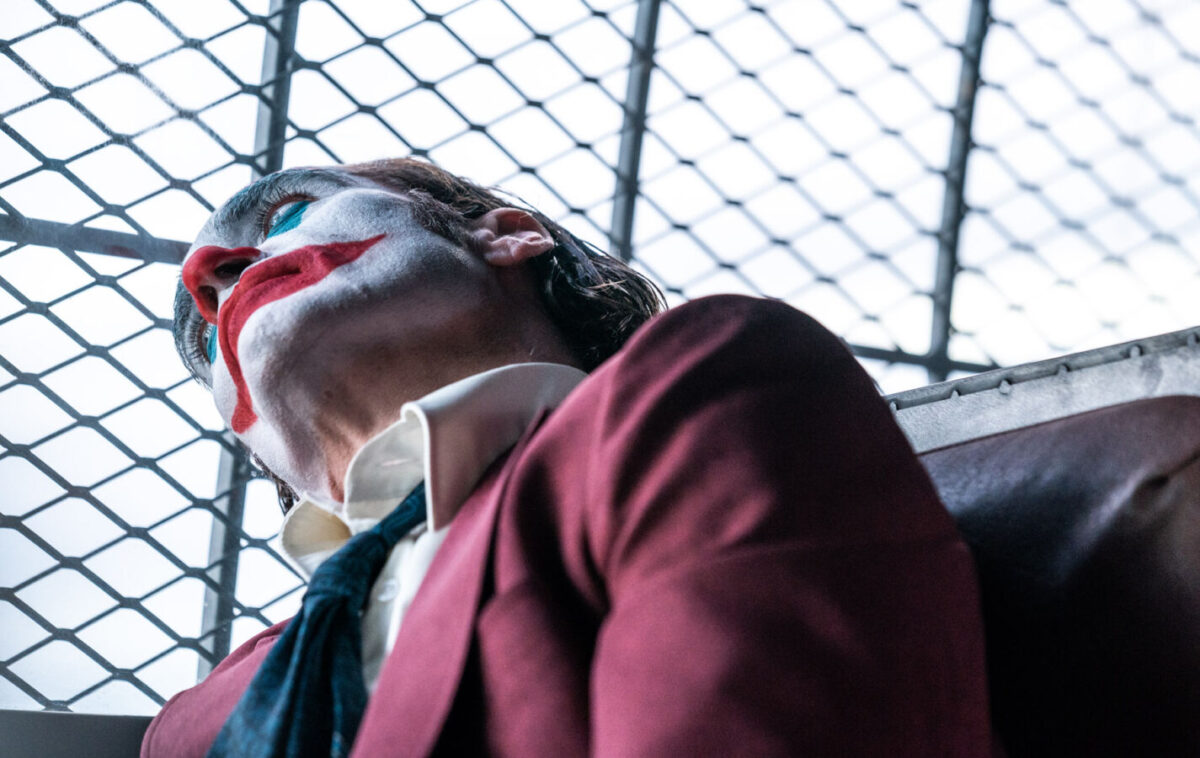
Despite its tonal inconsistencies and narrative flaws, Joker: Folie à Deux manages to find moments of dark humour amidst the bleakness. Phoenix, clearly comfortable in the role of Arthur, embraces the character’s blend of dark comedy and disturbing antics. Whether he’s awkwardly checking his position in the camera frame or hilariously mouthing silent curses in response to witness testimonies, Phoenix’s Arthur injects a much-needed dose of levity into the film. As Arthur oscillates between his personas, so too does his accent, shifting from British to Southern American, mirroring his internal conflict and unstable sense of self.
And, much like its protagonist, Joker: Folie à Deux wrestles with its disjointed and derivative identity. While the original Joker film presented a unified, though controversial, vision with strong visual and thematic motifs, Joker: Folie à Deux struggles to find its footing. It ventures into new territory with more polished cinematography and complex character interactions, along with a potential musical romance that ultimately fails to resonate. Visually, acoustically, and emotionally, the film does not deliver, burdened by the legacy of its predecessor and unable to break free from the gravitational pull of the original’s success.
Joker: Folie à Deux attempts to dance away from its roots, but in doing so, loses the rhythm that might have made it a worthy continuation of a complex story.
GEEK REVIEW SCORE
Summary
Joker: Folie à Deux fails to deliver a sequel worthy of its origin story, getting lost in a quagmire of forced musical sequences and narrative indecision that leaves little room for the kind of poignant character study that made the first film so compelling.
Overall
6.1/10-
Story - 6/10
6/10
-
Direction - 5.5/10
5.5/10
-
Characterisation - 7/10
7/10
-
Geek Satisfaction - 6/10
6/10

